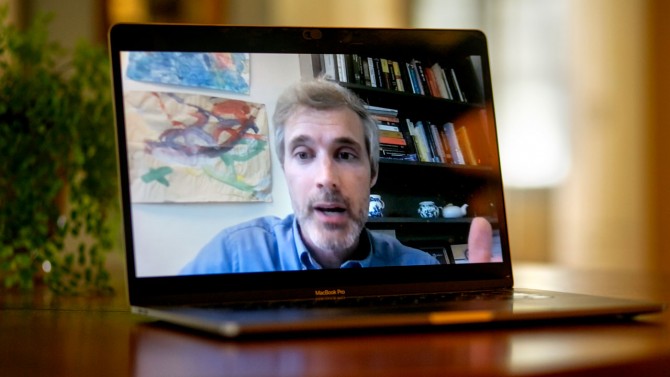Research: Vaccines, masks, testing to minimize risk on campus
By James Dean
Models developed by university experts predict that the combination of a highly vaccinated campus population and proven public health measures – including indoor mask-wearing and surveillance testing – will minimize the risk of virus transmission and provide the safest possible environment for in-person instruction this fall.
“The predictions from the models that we’ve been looking at suggest that we’re really quite safe from large outbreaks,” Peter Frazier, the Eleanor and Howard Morgan Professor of Operations Research and Information Engineering in the College of Engineering, said during an Aug. 11 town hall for faculty and staff.
Frazier leads the Cornell COVID-19 Modeling Team, whose data-driven analysis has helped guide university planning since the start of the pandemic, including last year’s safe reactivation of the Ithaca campus for hybrid instruction.
Amid global concern about summer spikes in the coronavirus’ more contagious delta variant, the team’s models estimate that vaccines and other mandatory safety measures will substantially reduce the risk of infection and transmission.
In classrooms at full capacity, the risk of transmission from one masked, vaccinated person to another is estimated to be reduced by 99.5%, compared to the risk between unvaccinated occupants not wearing masks, Frazier said. While emphasizing that models always have uncertainty, he said that they estimate a total of two infections associated with classroom transmission across the entire student body over the course of the semester if masking requirements are maintained. No transmission was attributed to classrooms last year, but the number of in-person classes was far smaller.
The risk for vaccinated instructors is also estimated to be very low – about 1 in 10,000, which Frazier said is comparable to the chance of being struck by lightning during one’s lifetime and about 100 times smaller than the recent rate of infection reported in the Ithaca area by the Tompkins County Health Department.
“Based on those numbers, I do think that it’s safe to hold class in person,” Frazier said.
He said the same safety measures that reduce risk for students and instructors would help protect other employees on campus as well: masks, vaccination rates much higher than the non-Cornell population, regular testing for certain staff, and avoiding close contact when practical.
A critical factor underpinning the models and planning is the excellent protection against infection or severe illness provided by vaccines, which are required for students (barring an approved medical or religious exemption) and have been adopted by faculty and staff at rates far higher than the general population.
As of Aug. 16, 95% of the campus community was fully vaccinated, according to the university’s COVID-19 tracking dashboard. The total includes more than 25,800 students and more than 11,800 faculty and staff, including 99% of faculty.
Research has shown vaccinated people are much less likely to become infected by the delta variant than unvaccinated people, Frazier said. While estimates vary, Frazier pointed to recent research in the journal The Lancet estimating that the Pfizer vaccine is about 80% effective against infection by the delta variant. And even if they do become infected, vaccinated people are significantly less likely than unvaccinated people to require hospitalization or transmit the virus to someone else, he said.
“The best thing that you can do protect yourself, but also to protect your family, is to get vaccinated,” Frazier said.
But because infection and transmission is possible, if much less likely, among the vaccinated, the university has instituted additional safety measures to start the semester: An indoor mask mandate in campus facilities, and surveillance testing covering a significant portion of the campus population – an estimated 25,000 tests each week.
Frazier pointed to research published in the journal PNAS in January 2021, before vaccines were widely available, suggesting that virus transmission between two parties is reduced by roughly 80% if just one is wearing a mask, and roughly 95% if both wear masks.
As an additional safety measure, unvaccinated or partially vaccinated undergraduate, graduate and professional students, as well as faculty and staff, will participate in surveillance testing twice weekly until fully vaccinated. In addition, many vaccinated students, faculty and staff will be tested weekly.
The university’s state-of-the-art surveillance testing program – a cornerstone of last year’s successful effort to minimize outbreaks when vaccines were not yet available – is expected to enable rapid identification, isolation and contact tracing for any positive cases, including asymptomatic cases and potential “breakthrough” infections among vaccinated individuals.
“The measures we have in place will be strong enough to prevent transmission from becoming widespread,” Frazier said, “and will substantially protect people that are interacting with students on campus.”
Frazier expects to see a bump in positive cases as students returning to Ithaca from around the country and the world are tested, then to see those numbers drop.
If the prevalence falls as expected and remains low, university leaders have said it might be possible to relax the masking requirement for vaccinated individuals this fall. But those decisions will continue to be guided by data, scientific research and guidance from national, state and local health departments, with policies adapting as conditions change.
“Even though things are a lot better, unfortunately the pandemic is not over, and we need to put these measures in place,” Frazier said. “With some modest changes to how we live – masking and getting tested – we can do most of the things we enjoy doing and continue to be safe.”
Media Contact
Get Cornell news delivered right to your inbox.
Subscribe

